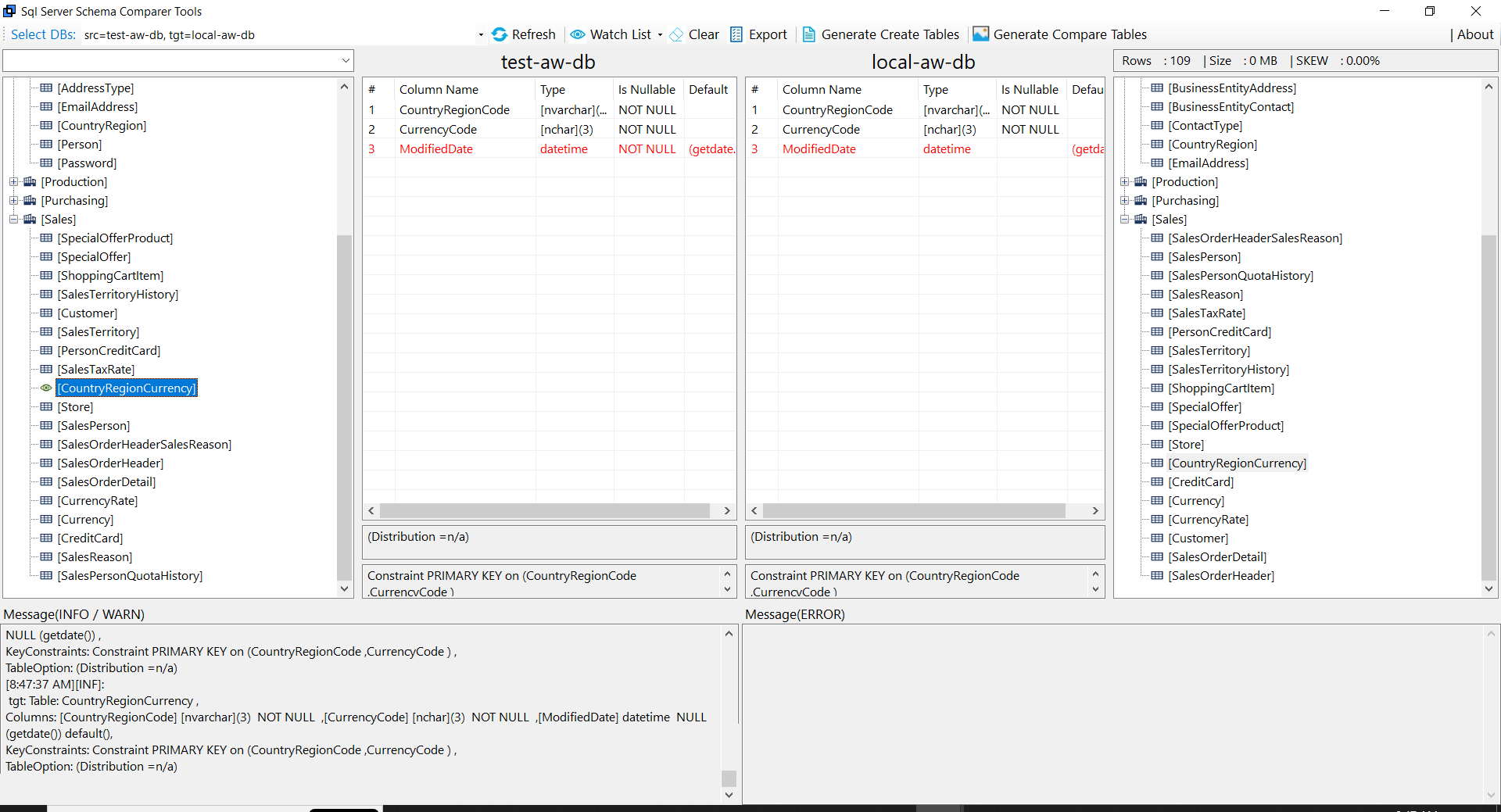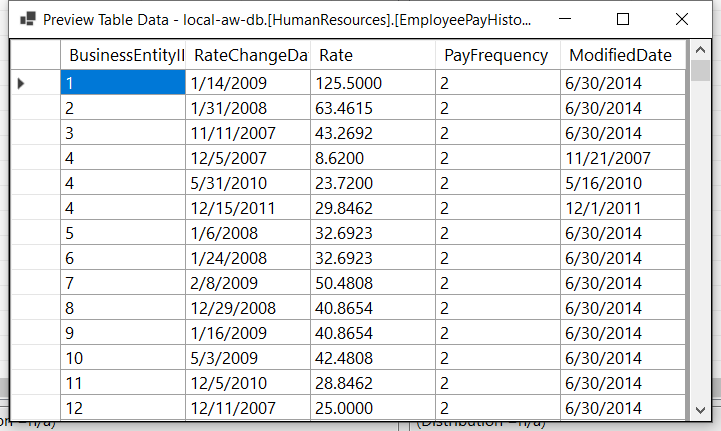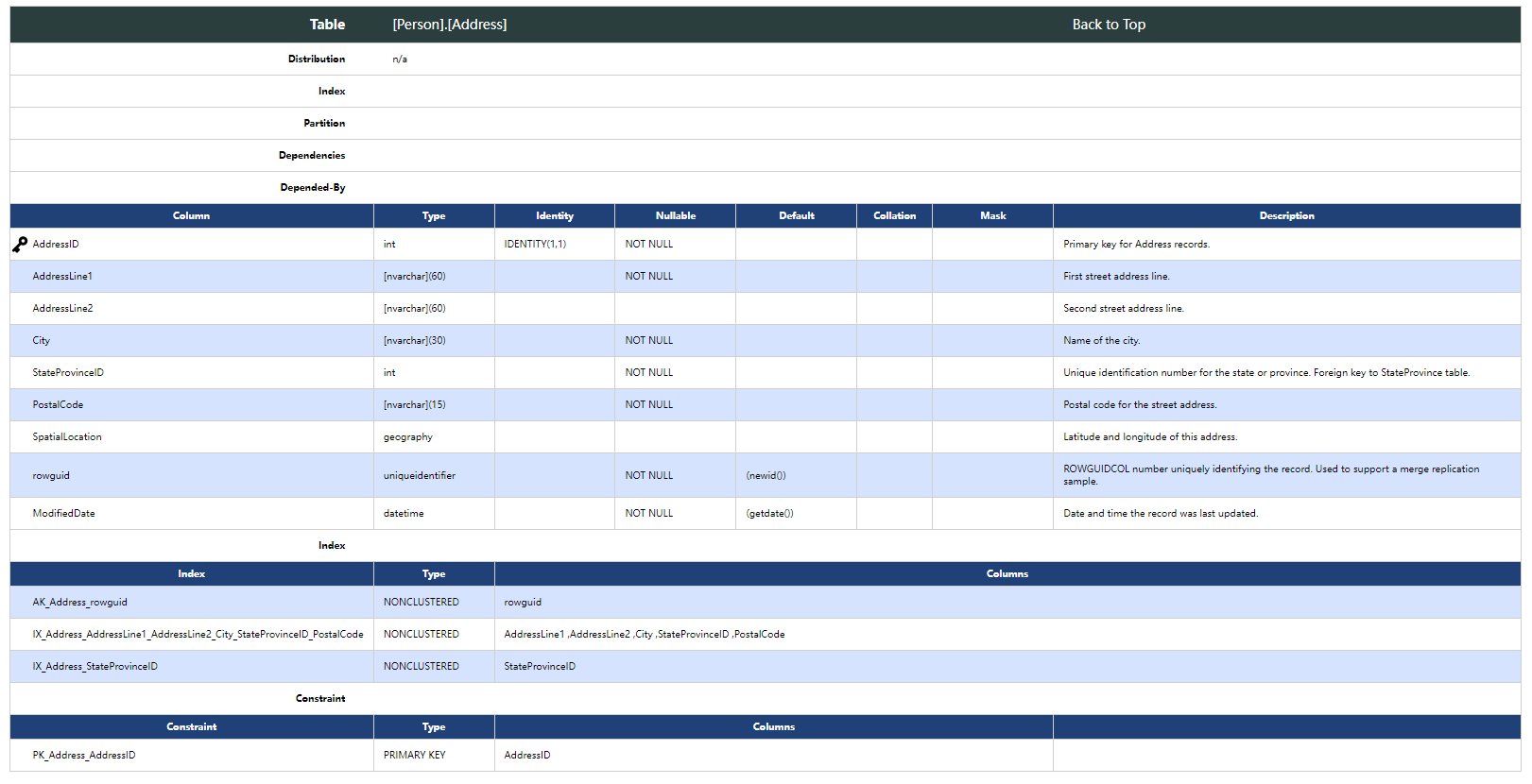[toc]
SchemaComparer.GUI.exe is a windows desktop application. It's designed to help user quickly understand database structure and easily find gaps of 2 databases:
- To explore schemas and tables of a specific database
- To explore the database gaps between 2 different environments
Now, as days went by, we brought more features to enhance it.
Sometimes when we engineers are working on a database project, no matter is it a business repository , or a data warehouse for BI, we always need to quickly understand what residents in the box -- schemas , tables, columns , and how the data is like.
No doubt it's boring to do it by handing-on code, which is easily to fail or fault. So we built this tool to entitle engineers a more convenient way to complete their job.
Thanks to Danny Xiang, who initiated this work!
| # | Features | Comments |
|---|---|---|
| F1 | List schemas and tables as a tree view | Informative |
| F2 | List columns information | Informative |
| F3 | Display table partition, constraints and distribution(DW only) | Informative |
| F4 | Display right table summary, including rows count, table size and SKEW(DW only) | Informative |
| F5 | Auto locate table with the same name in the right part | Ops |
| F6 | Compare/Batch Compare tables and highlight table differences | Find gaps |
| F7 | Find same name columns in all tables | In case of type mismatch |
| F8 | Generate Html Documents for schemas | Schema overview |
| F9 | Generate Gap amendment script for tables | DBA tool |
| F10 | Tables can be added into 'watch list' and can be removed out. | Ops |
| F11 | Generate Create Tables script for tables in 'watch list' | DBA tool |
| F12 | Export 'watch list' | Ops |
| F13 | Find table by fuzzy name | Ops |
| F14 | Preview table data | DBA tool |
| F15 | Profile table data (TBD) | DBA tool |
- [Both] (F1) Schema and Tables tree
- [Both] (F2, F3) Columns, Keys, Indexes and Table Info: partition, distribution
- [Both] (F6) Difference between same tables of both sides
- [Right] (F4) Table Summary with rows , size and skew rate (synapse)
- [Both] (F7) By double clicking a column, to find all same name columns in all tables, to compare their type and column properties
It'll be useful when the column types found are not same or even compatible. Like 'CreateDate', sometimes it's datetime type, sometimes it's int format as 'yyyyMMdd'. It'll bring incompatible when linking the two columns together for table joins. By this way, we can easily identify what causes the problem.
- [Left] (F14) By right-click on a left table, choose a table and preview it's data of first 1000 rows.
We can easily explore the data in a table by one click, to avoid boring script code typing.
[Both] (F15) By right-click on a left table, choose a table and profile it's data.
Reference : Data Profiling with T-SQL – SQLServerCentral
** This feature is in developing yet.
[LEFT] (F8) Export the metadata as HTML documents
The output html files are organized by schema names. Each file contains all tables metadata information, including table columns with properties, such as is_key, name, type, identity, nullable, default value, collation, mask and description, including table indexes, constraints, partitions and distribution(Synapse DW) information.
This is much more understandable than it's in SSMS or other developer's IDE.
Even better, we provide a dependencies link if we can define them in a reference file (I'll bring it in another article)
[LEFT] (F11) Add some tables into watch list and Generate Create-table scripts with their indexes and constraints
(TBD) Table Partitions are in Task queues, not ready now!
(issues here: some abandoned 'Create' words)
[LEFT] (F9) Add some tables into watch list and Generate Compare-table scripts
This means we can eliminates the gap between tables in 2 environments.
This feature is much complex when we consider data cannot loss when we change the table structure. I'll left the explanation later.
-
When program is starting, it'll load metadata of select databases, specified schemas ( in config) into cache file, then visualize them on WinForms .
-
The selected databases are configured in the configuration file. Usually we set 2 ~ 4 database connections of different environments, which will be brought for comparing.
-
In case the database are too complex to load fast, we can add some schemas in '
focusSchemas' section, which will constrain the schemas to populate. -
The cache files are json format, can be quicker loaded when we're comparing schemas. The cache will be expired in 10 minutes by default.
-
The cache files are independent by database name and schema name.
-
Metadata Html Documents are generated based on a RAZOR template file, which is at the path as configured.
-
Support either Synapse DW or Sql Database, by selecting an
ISqlCommandTextinstance (SynapseSqlCommandText, orSqlDatabaseCommandText), -
Support lineage dependency navigation on html doc. The dependency is referenced in '
reference' configuration section
For SQL Server or Azure SQL , the following code will collect metadata, including table schema , table name , columns , indexes, primary key, masking, partitions and table summary.
public static class SqlServerCmdTextConstant
{
public static readonly string cmd_get_schema = @"
SELECT DISTINCT
a.NAME AS [schema_name]
, a.schema_id AS [schema_id]
FROM sys.schemas a
INNER JOIN sys.objects b
ON a.schema_id = b.schema_id
ORDER BY a.NAME
";
public static readonly string cmd_get_table = @"
SELECT t.object_id AS table_id,
sch.[name] AS table_schema,
t.[name] AS table_name,
i.[type_desc] AS index_type
FROM sys.tables t
INNER JOIN sys.schemas AS sch
ON sch.schema_id = t.schema_id
LEFT JOIN sys.indexes i
ON t.[object_id] = i.[object_id]
AND i.[index_id] <= 1
WHERE (sch.[name] = @table_schema or @table_schema is null)
AND (t.[name] = @table_name or @table_name is null )
";
public static readonly string cmd_get_table_key_constraint = @"
SELECT stable.object_id AS table_id,
stable.NAME AS table_name,
sschema.NAME AS table_schema,
skc.NAME AS key_name,
skc.object_id AS key_id,
CASE
WHEN skc.type = 'pk' THEN 'PRIMARY KEY'
WHEN skc.type = 'uq' THEN 'UNIQUE'
ELSE skc.type
END AS key_type,
CASE
WHEN skc.is_enforced = 1 THEN ''
ELSE 'NOT ENFORCED'
END AS not_enforced,
sindex.type_desc AS index_type,
scolumn.NAME AS column_name,
CASE
WHEN sicolumn.is_descending_key = 1 THEN 'DESC'
ELSE 'ASC'
END AS column_ascend
FROM sys.key_constraints AS skc
INNER JOIN sys.tables AS stable
ON stable.object_id = skc.parent_object_id
LEFT JOIN sys.indexes AS sindex
ON sindex.object_id = skc.parent_object_id
AND sindex.NAME = skc.NAME
LEFT JOIN sys.index_columns AS sicolumn
ON sicolumn.object_id = skc.parent_object_id
AND sicolumn.index_id = sindex.index_id
LEFT JOIN sys.columns AS scolumn
ON scolumn.object_id = skc.parent_object_id
AND scolumn.column_id = sicolumn.column_id
INNER JOIN sys.schemas AS sschema
ON sschema.schema_id = stable.schema_id
WHERE sschema.NAME = @table_schema
AND (stable.NAME = @table_name or @table_name is null)
";
public static readonly string cmd_get_table_column = @"
DECLARE @db_collation NVARCHAR(128)
SET @db_collation = (SELECT collation_name
FROM sys.databases
WHERE NAME = Db_name())
;
WITH tcolumn AS
(SELECT stable.object_id AS [table_id],
scolumn.[column_id] AS [column_id],
sschema.[name] AS [table_schema],
stable.[name] AS [table_name],
scolumn.[name] AS [column_name],
stype.[name] AS [data_type],
scolumn.[max_length] AS [max_length],
scolumn.[precision] AS [precision],
scolumn.[scale] AS [scale],
CASE
WHEN ix_col.object_id IS null then ''
ELSE 'YES' end AS [is_key],
CASE
WHEN stype.[name] IN ( 'decimal', 'numeric' ) THEN
stype.NAME + '('
+ Cast(scolumn.PRECISION AS VARCHAR(8))
+ ',' + Cast(scolumn.[scale] AS VARCHAR(8))
+ ')'
WHEN scolumn.max_length < 0 THEN stype.NAME + '(max)'
WHEN stype.NAME IN ( 'char', 'varbinary', 'varchar' ) THEN
stype.NAME + '('
+ Cast(scolumn.max_length AS VARCHAR(8))
+ ')'
WHEN stype.NAME IN ( 'nchar', 'nvarchar' ) THEN
stype.NAME + '('
+ Cast(scolumn.max_length/2 AS VARCHAR(8))
+ ')'
ELSE stype.[name]
END AS type_string
--,isnull(scolumn.[collation_name],'') as collation_name
,
CASE
WHEN scolumn.collation_name <> @db_collation THEN
scolumn.collation_name
ELSE ''
END AS collation_name,
CASE
WHEN scolumn.[is_nullable] = 1 THEN 'NULL'
ELSE 'NOT NULL'
END AS nullable,
CASE
WHEN scolumn.[is_identity] = 1 THEN
'IDENTITY('
+ Cast(idnt.seed_value AS VARCHAR(16)) +
','
+ Cast(idnt.increment_value AS VARCHAR(16)
)
+ ')'
ELSE ''
END AS identity_string,
scolumn.[default_object_id] AS [default_object_id],
dc.[definition] AS [default_definition],
scolumn.[is_masked] AS [is_masked],
mc.masking_function AS [masking_function],
sep.Value AS [description]
FROM sys.columns AS scolumn
INNER JOIN sys.tables AS stable
ON stable.[object_id] = scolumn.[object_id]
INNER JOIN sys.schemas AS sschema
ON sschema.[schema_id] = stable.[schema_id]
INNER JOIN sys.types AS stype
ON scolumn.system_type_id = stype.system_type_id
AND scolumn.user_type_id = stype.user_type_id
LEFT JOIN sys.indexes ix -- for primary key
ON ix.object_id = stable.[object_id] and ix.is_primary_key=1
LEFT JOIN sys.index_columns ix_col
on ix.index_id = ix_col.index_id
AND ix_col.object_id = stable.[object_id]
AND ix_col.column_id = scolumn.column_id
LEFT JOIN sys.identity_columns AS idnt
ON idnt.[object_id] = scolumn.[object_id]
AND idnt.column_id = scolumn.column_id
LEFT JOIN SYS.default_constraints dc
on scolumn.[default_object_id] = dc.[object_id]
LEFT JOIN SYS.masked_columns mc
on stable.[object_id] = mc.[object_id] and scolumn.column_id = mc.column_id
LEFT JOIN sys.extended_properties sep on stable.object_id = sep.major_id
and scolumn.column_id = sep.minor_id
and [class] = 1
and sep.name = 'MS_Description'
WHERE stable.type = 'u')
SELECT *
FROM tcolumn
WHERE table_schema = @table_schema
AND (table_name = @table_name or @table_name is null)
ORDER BY column_id
";
/// <summary>
/// including both primary index and other index
/// </summary>
/// <remarks>
/// IN CASE index type ='heap', there is no column joined, so use 'left join'
/// </remarks>
public static readonly string cmd_get_table_index = @"
WITH ti
AS (SELECT sindex.object_id AS table_id,
sschema.NAME AS table_schema,
stable.NAME AS table_name,
sindex.NAME AS index_name,
sindex.type_desc AS index_type,
CASE
WHEN sindex.[IS_UNIQUE] = 1 THEN 'UNIQUE'
ELSE '' END AS [UNIQUE_EXP],
scolumn.NAME AS column_name,
sicolumn.key_ordinal,
sindex.index_id,
CASE
WHEN sicolumn.is_descending_key = 1 THEN 'DESC'
ELSE 'ASC'
END AS column_ascending,
sds.NAME AS data_space
FROM sys.indexes AS sindex
INNER JOIN sys.tables AS stable
ON stable.object_id = sindex.object_id
INNER JOIN sys.schemas AS sschema
ON sschema.schema_id = stable.schema_id
LEFT JOIN [sys].[index_columns] AS sicolumn
ON sicolumn.object_id = sindex.object_id
AND sicolumn.index_id = sindex.index_id
LEFT JOIN sys.columns AS scolumn
ON scolumn.object_id = sindex.object_id
AND scolumn.column_id = sicolumn.column_id
LEFT JOIN sys.data_spaces AS sds
ON sds.data_space_id = sindex.data_space_id
WHERE 1=1
AND sindex.is_unique_constraint = 0
AND sindex.is_primary_key = 0
)
SELECT *
FROM ti
WHERE ti.table_schema = @table_schema
AND (ti.table_name = @table_name or @table_name is null)
ORDER BY ti.table_schema,
ti.table_name,
ti.index_name,
ti.key_ordinal
";
public static readonly string cmd_get_table_partition = @"
SELECT o.[object_id] AS [table_id],
s.[name] AS [TABLE_SCHEMA],
o.[name] AS [TABLE_NAME],
c.[name] AS [COLUMN_NAME],
( CASE
WHEN pf.[boundary_value_on_right] = 1 THEN 'right'
ELSE 'left'
END ) AS [BOUNDARY_TYPE],
(SELECT String_agg(Cast(prv.[value] AS VARCHAR), ',')
FROM sys.partition_range_values prv
WHERE prv.[function_id] = ps.[function_id]) AS [BOUNDARY_VALUES]
FROM sys.objects o
INNER JOIN sys.schemas s
ON s.[schema_id] = o.[schema_id]
INNER JOIN sys.indexes i
ON i.[object_id] = o.[object_id]
INNER JOIN sys.index_columns ic
ON ic.[object_id] = o.[object_id]
AND ic.[index_id] = i.[index_id]
AND ic.[partition_ordinal] >= 1
INNER JOIN sys.columns c
ON c.object_id = o.object_id
AND c.[column_id] = ic.[column_id]
INNER JOIN sys.data_spaces ds
ON ds.[data_space_id] = i.[data_space_id]
INNER JOIN sys.partition_schemes ps
ON ps.[data_space_id] = i.[data_space_id]
INNER JOIN sys.partition_functions pf
ON ps.[function_id] = pf.[function_id]
WHERE s.[name] = @table_schema AND (o.[name] = @table_name or @table_name is null)
";
public static readonly string cmd_get_table_summary = @"
SELECT
s.Name AS [table_schema],
t.Name AS [table_name],
t.OBJECT_ID AS [table_id],
p.Rows AS [total_row_count],
CAST(ROUND((SUM(a.used_pages) / 128.00), 2) AS NUMERIC(36, 2))
AS [Used_MB],
CAST(ROUND((SUM(a.total_pages) - SUM(a.used_pages)) / 128.00, 2) AS NUMERIC(36, 2))
AS [Unused_MB],
CAST(ROUND((SUM(a.total_pages) / 128.00), 2) AS NUMERIC(36, 2))
AS [total_size_MB]
FROM sys.tables t
INNER JOIN sys.indexes i ON t.OBJECT_ID = i.object_id
INNER JOIN sys.partitions p ON i.object_id = p.OBJECT_ID AND i.index_id = p.index_id
INNER JOIN sys.allocation_units a ON p.partition_id = a.container_id
INNER JOIN sys.schemas s ON t.schema_id = s.schema_id
WHERE s.[name] = @table_schema AND (t.[name] = @table_name or @table_name is null)
GROUP BY t.Name, t.OBJECT_ID, s.Name, p.Rows
ORDER BY s.Name, t.Name
";
}For synapse , some differences, such as distribution:
public static class SynapseCmdTextConstant
{
public static readonly string cmd_get_table_distribution = @"
declare @isSqlDW bit
set @isSqlDW = case when @@version like '%warehouse%' then 1 else 0 end
if(@isSqlDW = 1)
begin
SELECT t.object_id AS [table_id],
sch.NAME AS [table_schema],
t.NAME AS [table_name],
tp.[distribution_policy_desc] AS [distribution_policy],
Isnull(c.[name], '') AS [distribution_column]
FROM sys.tables t
INNER JOIN sys.schemas AS sch
ON sch.schema_id = t.schema_id
LEFT JOIN sys.pdw_table_distribution_properties tp
ON t.[object_id] = tp.[object_id]
LEFT JOIN (SELECT *
FROM sys.pdw_column_distribution_properties
WHERE distribution_ordinal = 1) cdp
ON t.[object_id] = cdp.[object_id]
LEFT JOIN sys.columns c
ON cdp.[object_id] = c.[object_id]
AND cdp.[column_id] = c.[column_id]
WHERE (sch.NAME = @table_schema AND t.NAME = @table_name ) or (@table_name is null)
end
";
public static readonly string cmd_get_table_partition = @"
SELECT o.[object_id] AS [table_id],
s.[name] AS [TABLE_SCHEMA],
o.[name] AS [TABLE_NAME],
c.[name] AS [COLUMN_NAME],
( CASE
WHEN pf.[boundary_value_on_right] = 1 THEN 'right'
ELSE 'left'
END ) AS [BOUNDARY_TYPE],
(SELECT String_agg(Cast(prv.[value] AS VARCHAR), ',')
FROM sys.partition_range_values prv
WHERE prv.[function_id] = ps.[function_id]) AS [BOUNDARY_VALUES]
FROM sys.objects o
INNER JOIN sys.schemas s
ON s.[schema_id] = o.[schema_id]
INNER JOIN sys.indexes i
ON i.[object_id] = o.[object_id]
INNER JOIN sys.index_columns ic
ON ic.[object_id] = o.[object_id]
AND ic.[index_id] = i.[index_id]
AND ic.[partition_ordinal] >= 1
INNER JOIN sys.columns c
ON c.object_id = o.object_id
AND c.[column_id] = ic.[column_id]
INNER JOIN sys.data_spaces ds
ON ds.[data_space_id] = i.[data_space_id]
INNER JOIN sys.partition_schemes ps
ON ps.[data_space_id] = i.[data_space_id]
INNER JOIN sys.partition_functions pf
ON ps.[function_id] = pf.[function_id]
WHERE s.[name] = @table_schema AND (o.[name] = @table_name or @table_name is null)
";
public static readonly string cmd_get_table_summary = @"
SELECT s.NAME AS [table_schema],
o.NAME AS [table_name],
o.object_id AS [table_id],
Max([row_count]) AS [row_count_max],
Min([row_count]) AS [row_count_min],
CASE
WHEN Max([row_count]) < 1000 THEN 0
ELSE ( Max([row_count]) - Min([row_count]) ) * 1.0 / Max([row_count])
END AS [skew],
Sum ([row_count]) AS [total_row_count],
Sum(nps.[in_row_data_page_count]
+ nps.[row_overflow_used_page_count]
+ nps.[lob_used_page_count]) * 8 / 1000 AS [total_size_MB]
FROM sys.dm_pdw_nodes_db_partition_stats nps
INNER JOIN sys.pdw_nodes_tables nt
ON nt.[object_id] = nps.[object_id]
AND nt.[pdw_node_id] = nps.[pdw_node_id]
AND nt.[distribution_id] = nps.[distribution_id]
INNER JOIN sys.pdw_table_mappings tm
ON tm.[physical_name] = nt.[name]
INNER JOIN sys.objects o
ON tm.object_id = o.object_id
INNER JOIN sys.schemas s
ON o.schema_id = s.schema_id
WHERE s.NAME = @table_schema
GROUP BY s.NAME,
o.NAME,
o.object_id
";
}






